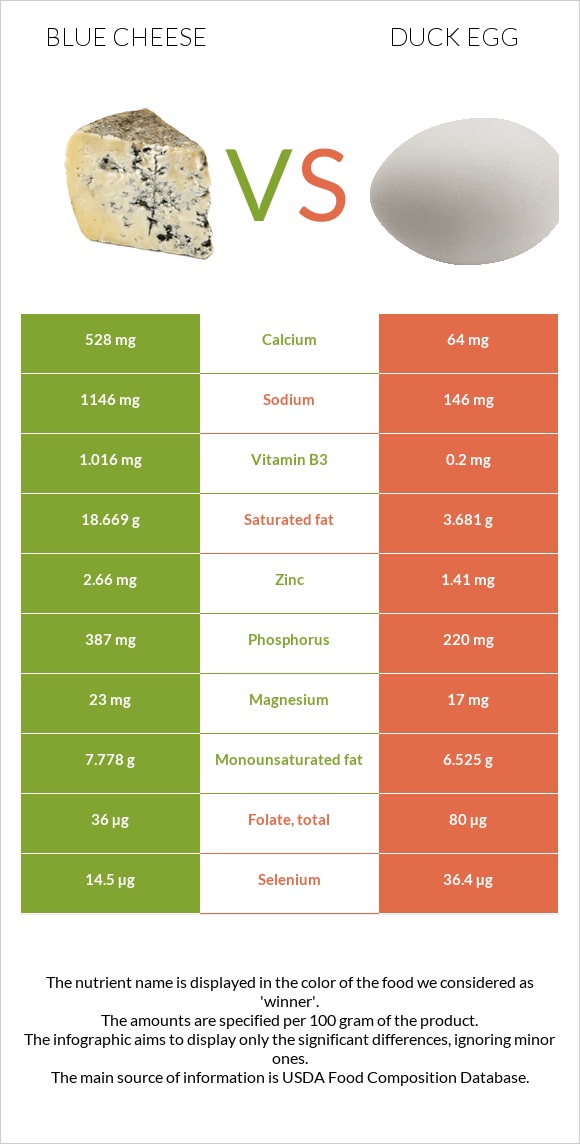Blue cheese vs. Duck egg — In-Depth Nutrition Comparison
Compare
Important differences between blue cheese and duck eggs
- Blue cheese has more calcium, phosphorus, and zinc; however, duck eggs have more vitamin B12, choline, iron, and selenium.
- Duck eggs' daily need coverage for cholesterol is 270% more.
- Blue cheese has 8 times more calcium than duck eggs. Blue cheese has 528mg of calcium, while duck eggs have 64mg.
- Duck eggs are lower in sodium.
The food varieties used in the comparison are Cheese, blue and Egg, duck, whole, fresh, raw.
Infographic

Infographic link
Mineral Comparison
Mineral comparison score is based on the number of minerals by which one or the other food is richer. The "coverage" charts below show how much of the daily needs can be covered by 300 grams of the food.
| Contains more MagnesiumMagnesium | +35.3% |
| Contains more CalciumCalcium | +725% |
| Contains more PotassiumPotassium | +15.3% |
| Contains more ZincZinc | +88.7% |
| Contains more PhosphorusPhosphorus | +75.9% |
| Contains more IronIron | +1141.9% |
| Contains more CopperCopper | +55% |
| Contains less SodiumSodium | -87.3% |
| Contains more ManganeseManganese | +322.2% |
| Contains more SeleniumSelenium | +151% |
Vitamin Comparison
Vitamin comparison score is based on the number of vitamins by which one or the other food is richer. The "coverage" charts below show how much of the daily needs can be covered by 300 grams of the food.
| Contains more Vitamin B3Vitamin B3 | +408% |
| Contains more Vitamin KVitamin K | +500% |
| Contains more Vitamin EVitamin E | +436% |
| Contains more Vitamin DVitamin D | +240% |
| Contains more Vitamin B1Vitamin B1 | +437.9% |
| Contains more Vitamin B6Vitamin B6 | +50.6% |
| Contains more Vitamin B12Vitamin B12 | +342.6% |
| Contains more FolateFolate | +122.2% |
All nutrients comparison - raw data values
| Nutrient |  |
 |
DV% diff. |
| Cholesterol | 75mg | 884mg | 270% |
| Vitamin B12 | 1.22µg | 5.4µg | 174% |
| Saturated fat | 18.669g | 3.681g | 68% |
| Calcium | 528mg | 64mg | 46% |
| Choline | 15.4mg | 263.4mg | 45% |
| Iron | 0.31mg | 3.85mg | 44% |
| Sodium | 1146mg | 146mg | 43% |
| Selenium | 14.5µg | 36.4µg | 40% |
| Phosphorus | 387mg | 220mg | 24% |
| Fats | 28.74g | 13.77g | 23% |
| Protein | 21.4g | 12.81g | 17% |
| Zinc | 2.66mg | 1.41mg | 11% |
| Vitamin B1 | 0.029mg | 0.156mg | 11% |
| Folate | 36µg | 80µg | 11% |
| Calories | 353kcal | 185kcal | 8% |
| Vitamin E | 0.25mg | 1.34mg | 7% |
| Vitamin D | 21 IU | 69 IU | 6% |
| Vitamin D | 0.5µg | 1.7µg | 6% |
| Vitamin B6 | 0.166mg | 0.25mg | 6% |
| Vitamin B3 | 1.016mg | 0.2mg | 5% |
| Vitamin B5 | 1.729mg | 1.862mg | 3% |
| Monounsaturated fat | 7.778g | 6.525g | 3% |
| Polyunsaturated fat | 0.8g | 1.223g | 3% |
| Copper | 0.04mg | 0.062mg | 2% |
| Vitamin B2 | 0.382mg | 0.404mg | 2% |
| Vitamin K | 2.4µg | 0.4µg | 2% |
| Magnesium | 23mg | 17mg | 1% |
| Potassium | 256mg | 222mg | 1% |
| Manganese | 0.009mg | 0.038mg | 1% |
| Net carbs | 2.34g | 1.45g | N/A |
| Carbs | 2.34g | 1.45g | 0% |
| Sugar | 0.5g | 0.93g | N/A |
| Vitamin A | 198µg | 194µg | 0% |
| Tryptophan | 0.312mg | 0.26mg | 0% |
| Threonine | 0.785mg | 0.736mg | 0% |
| Isoleucine | 1.124mg | 0.598mg | 0% |
| Leucine | 1.919mg | 1.097mg | 0% |
| Lysine | 1.852mg | 0.951mg | 0% |
| Methionine | 0.584mg | 0.576mg | 0% |
| Phenylalanine | 1.087mg | 0.84mg | 0% |
| Valine | 1.556mg | 0.885mg | 0% |
| Histidine | 0.758mg | 0.32mg | 0% |
Macronutrient Comparison
Macronutrient breakdown side-by-side comparison
Protein:
21.4 g
Fats:
28.74 g
Carbs:
2.34 g
Water:
42.41 g
Other:
5.11 g
Protein:
12.81 g
Fats:
13.77 g
Carbs:
1.45 g
Water:
70.83 g
Other:
1.14 g
| Contains more ProteinProtein | +67.1% |
| Contains more FatsFats | +108.7% |
| Contains more CarbsCarbs | +61.4% |
| Contains more OtherOther | +348.2% |
| Contains more WaterWater | +67% |
Fat Type Comparison
Fat type breakdown side-by-side comparison
Saturated fat:
Sat. Fat
18.669 g
Monounsaturated fat:
Mono. Fat
7.778 g
Polyunsaturated fat:
Poly. Fat
0.8 g
Saturated fat:
Sat. Fat
3.681 g
Monounsaturated fat:
Mono. Fat
6.525 g
Polyunsaturated fat:
Poly. Fat
1.223 g
| Contains more Mono. FatMonounsaturated fat | +19.2% |
| Contains less Sat. FatSaturated fat | -80.3% |
| Contains more Poly. FatPolyunsaturated fat | +52.9% |





